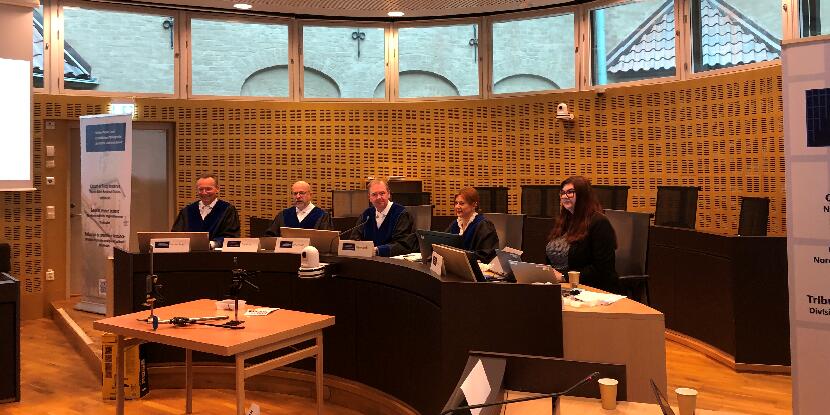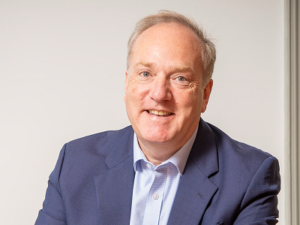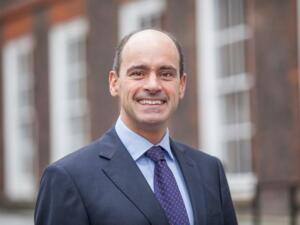UK barristers and the UPC: Bringing the British art of advocacy to the new court
UK barristers are showing increasing interest in UPC cases. However, even for most barristers, the path to the UPC leads through Dublin. In this two-part series, JUVE Patent examines what it is about the UPC that is attracting the barrister community and what barristers can bring to the court.
19 May 2025 by Mathieu Klos
Richard Davis, barrister at Hogarth Chambers, is likely the first UK barrister to plead a case before the UPC. In late March, he represented Stanley Black & Decker before the Nordic Baltic local division in a dispute with Viking Arm over hand tools.
Davis, instructed by UK patent attorney firm Dehns, is one of few UK barristers qualified as both barrister and patent attorney. This dual qualification proves advantageous, as his status as a European patent attorney meant Davis did not need to take the so-called “Irish route” to the UPC. Unlike most colleagues, he could register directly as a UPC representative.

Barrister Richard Davis pleaded his first case for his client Stanley Black & Decker before an international panel of the Nordic-Baltic regional division. ©Richard Davis
Many practitioners have taken the Irish route since Brexit, including numerous UK solicitors at firms such as Bristows, Powell Gilbert and Carpmaels & Ransford. Their aim has been to secure admission in Ireland and subsequently as UPC representatives. As these UK law firms are increasingly active in UPC cases, more UK barristers are following suit. However, unlike Davis, most lack European patent attorney qualifications.
A fine line
The Irish route presents a challenge: while Ireland has signed the UPC agreement, it has not ratified it due to a pending referendum. Some patent experts therefore question the route’s legal certainty should it face review.
Concerns about this approach have surfaced in UPC hearings involving UK solicitors. However, UPC judges currently appear disinclined to scrutinise UK solicitors’ authority to represent clients.
“The Irish route presents a challenge”
If ratification of the UPC Agreement were crucial, Spanish and Polish lawyers would also lack authority to represent clients. British patent litigators maintain that EU freedom to provide services permits them to act at the UPC with Irish admission.
For now, UK solicitors and barristers continue to qualify in Ireland before applying for UPC representative registration.
A small community
Tom Mitcheson KC, among the most prominent barristers for patent cases at Three New Square, was one of the first London barristers to take the Irish route in 2020 and register as a UPC representative in 2023. He describes this as responding to client needs. “There are clients who ask us if we can help with particular UPC cases and who also want us to be involved in their cases at the UPC in the long term,” says Mitcheson. To date, he has provided background advice to clients on UPC matters in collaboration with London solicitor firms.
- Richard Davis
- Tom Mitcheson
London’s patent barrister community remains relatively small. Three traditional sets dominate the market: 8 New Square, 11 South Square and Three New Square. They handle UK patent cases across various technical fields, with numerous renowned King’s Counsel and junior barristers.
Commercial barristers increasingly work on SEP and FRAND-related cases. Sets such as Blackstone, Hogarth, Monckton and Brick Court Chambers operate in this space. As SEP cases form a significant portion of UPC work, such business attracts these sets.
No office requirement, but an exam
Unlike UK solicitors with Irish roots, the process is different for barristers. “UK barristers must pass an exam to be admitted as Irish barristers,” explains Daniel Selmi, a junior barrister at Three New Square who qualified as an Irish barrister in October 2024. He awaits confirmation as a UPC representative.
Thomas Lunt, another young barrister at Three New Square, also recently passed the Irish exam. They represent a growing trend among UK barristers seeking UPC representation rights.
The exam covers Irish constitutional law and the Irish legal system, Selmi adds. “The admission process we face in Ireland is difficult. However, barristers are not currently required to have an office in Dublin or any other Irish city to prove they have a place of business in Ireland.”
This differs from solicitors’ requirements, explaining why firms like Powell Gilbert, Bristows and Carpmaels maintain Dublin offices.
A question of advocacy
The Irish route proves unnecessary for Hogarth’s Richard Davis, who qualifies directly as a European patent attorney. The same applies to Richard Darby, a junior barrister at Three New Square with dual qualification.
Davis had previously represented Stanley Black & Decker in EPO proceedings and maintained a working relationship with Dehns partner Paul Harris.
“The role of UK barristers in UPC cases will primarily be advocacy”
On 25 March 2025, he presented his client’s case before the Nordic-Baltic regional division, handling advocacy in the UPC courtroom. He argued both the validity of Viking Arm’s patent and his client’s non-infringement position.
“The role of UK barristers in UPC proceedings will primarily be to take on the advocacy,” says Richard Davis. “Our role in the teams will be to narrow down the arguments for the courts in each written submission and in the oral hearing. This requires a good overall strategy, which we barristers can provide – we ‘think trial’,” says Davis.
Others agree that UK barristers’ extensive litigation experience benefits UPC cases. UK barristers are not only experienced in advocating complex patent issues before a court. “Our core activities are much broader than that,” says Mark Chacksfield, a well-known barrister at 8 New Square. “We help structure proceedings from the outset, deal with evidence and technical issues and undertake written advocacy too. We already spend far more time on written than oral advocacy, even in UK patent cases but also in lengthy oral hearings and cross-examinations.”
Cross-border contribution
“For strategic reasons, clients will probably instruct us to handle UPC cases that have a parallel UK element,” says Daniel Selmi from Three New Square.
- Mark Chacksfield
- Daniel Selmi
In such pan-European cases, the UK suits are typically filed early and proceedings follow swiftly. Barristers view their early case knowledge as crucial for UPC involvement.
“In most proceedings, especially with international dimensions, barristers are normally involved throughout a dispute, sometimes before proceedings are started,” explains Andrew Lykiardopoulos. He is one of 8 New Square’s most prominent King’s Counsel and currently its sole registered UPC representative. “We are familiar with many pan-European cases and their key legal arguments at an early stage and need to ensure consistency with UK cases in the work we already do in the UK.”
“Following the UPC decisions on so-called long-arm jurisdiction, cross-border issues will become increasingly important. I believe that we can help as barristers in this area. The same applies if cross-examination becomes more common at the UPC,” says Selmi. “The judges of the Baltic UPC division are currently sending out signals to this effect. We have excellent experience here from UK proceedings. If there is then a UK case involving cross-examination, we are ideally placed to assist in UPC proceedings as well.”
Expanding the teams
The complexity and tight deadlines of UPC cases creates opportunities for barristers. Tom Mitcheson believes barristers can support other firms: “Large teams are important in UPC proceedings for meeting the tight deadlines. We can lend additional capacity to smaller litigation teams in patent attorney or medium-sized law firms.”
“As self-employed individuals, UK barristers can be very flexible in terms of time management” says Davis. “We are therefore well placed to support other teams in managing their UPC proceedings with such tight deadlines.” This could be particularly advantageous for defendants, who may have little or no notice that proceedings will be issued.
Sources of UPC work
British solicitor firms traditionally instruct UK barristers. Direct client connections, like those of Richard Davis, remain rare. Seldomly will clients appoint UK barristers alongside German lawyers in German local division proceedings.
“It will be difficult to sell our expertise to continental firms”
“I don’t see barristers conducting UPC proceedings as the sole main representative. Here at Three New Square, we are more likely to handle UPC cases together with law firms,” says Nick Hill, senior clerk. “These may be UK solicitor or patent attorney firms, but of course also German, French or Dutch law firms asking for assistance on particular issues.”
Richard Davis expects that he will mainly be brought in on UPC cases by UK based patent attorneys. “They are their clients’ European advisors and are familiar with that ‘something extra’ that barristers can contribute.
When it comes to continental law and patent attorney firms, other barrister think that it will be very difficult for UK barrister to sell their expertise. “It is difficult to convince them that barristers have something extra to contribute.”
Establishing client relationships for exclusive UPC instruction is not barristers’ cup of tea, being unaccustomed to direct business development.
- Andrew Lykiardopoulos
- Daniel Alexander
“We do not “pitch” for clients in competition with any firms. This would not change if we were active in the UPC,” says Daniel Alexander from 8 New Square, a star among UK IP barristers. “We would only become involved in a case when a patent attorney or solicitor firm instructed us to support them after discussion with a client.”
Colleague Andrew Lykiardopoulos adds, “I would be surprised if clients were to instruct us directly for UPC cases. Our profession is based on referrals, working as part of teams of solicitors or attorneys, brought in for particular cases. This would continue for UPC cases.”
The barrister’s dilemma
Active client acquisition and business development would conflict with barristers’ professional ethos. “The UK Bar has a strong professional ethos of providing equal representation to all regardless of the issue. UK barristers should be open to support everyone who has an issue in court,” says Daniel Alexander. Targeted business development would contradict this principle.
Leading UPC proceedings as sole representatives would also require substantial infrastructure investment without guaranteed returns. Unlike solicitor firms, the barrister sets don’t have the administrative set-up to organise and manage complex pan-European cases on their own.
UK barristers therefore view UPC involvement as complementary to existing cases as part of law firm relationships. For now, at least, continental IP firms need not worry about additional UK competition. Moreover, with UK solicitors and patent attorneys a crucial source of litigation work, barristers will likely want to avoid any rivalries.







